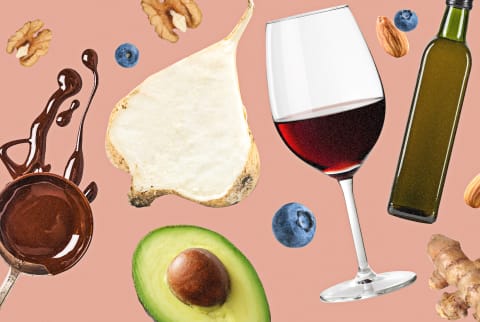20 Foods To Naturally Increase Your Brain Power


We are all at risk for brain degeneration once we reach a certain age, but luckily there are plenty of ways to strengthen brain health earlier in life and protect ourselves down the line. Food choices may be the most influential variable we can control when it comes to the vitality and functionality of the brain. Here are 20 nutrient-rich foods that are as healthy for the body as they are for the mind:
Olive oil
High-quality olive oil is rich in polyphenols, which are powerful brain-protective antioxidants.
Coconut oil
Coconut oil enhances the ability of the brain's neurons to use energy1 and reduces the production of damaging free radicals. It's also a good source of saturated fats, which help the integrity and function of brain cell membranes.
Wild salmon
Sustainably sourced salmon is a terrific natural source of the omega-3 oil DHA, which plays a pivotal role in maintaining the health of brain cells and actually helps to stimulate the growth of brain cells in the brain's memory center.
Blueberries
Power-packed with brain-protective antioxidants, blueberries also help to reduce inflammation, a cornerstone of virtually all brain degenerative disorders.
Turmeric
The important role of turmeric in brain health has been described in the Vedic texts dating back more than 3,000 years, and the popular superfood acts to turn on the parts of our DNA that help reduce inflammation.
Eggs
Eggs are rich in choline, the precursor chemical for acetylcholine, one of the most fundamental neurotransmitters2.
Dandelion greens
These underrated greens are rich in prebiotic fiber, the specific type of fiber that helps nurture the growth of brain-supportive gut bacteria.
Walnuts
In addition to being a wonderful source of fiber, walnuts are rich in a variety of nutrients that support brain health including vitamin E, omega-3 fats, copper, and manganese.
Asparagus
Asparagus is high in folate and prebiotic fiber that supports brain-healthy gut bacteria.
Kimchi
The traditional Korean fermented dish is loaded with probiotic bacteria that promote brain health.
Jicama
Jicama, also known as Mexican yam, is high in vitamin B6, folate, and vitamin E. It's one of the best sources of prebiotic fiber out there.
Kale
There's a reason for the hype: Kale is a great low-carb vegetable that's rich in vitamins C, K, and A, as well as potassium and iron.
Broccoli
Broccoli is high in sulfurophane, a chemical that aids in detoxification, reduces inflammation, and fights damage from free radicals.
Avocado
High in monounsaturated fats to protect brain cells, avocado oil has also been shown to help maintain healthy blood pressure levels3.
Red wine
Red wine—when enjoyed in moderation—is rich in polyphenols that may actually boost brain blood flow.
Dark chocolate
Like red wine, dark chocolate is another crowd favorite that is also rich in polyphenols.
Spinach
Spinach is packed with brain-protective antioxidants along with vitamin K, folate, and lutein4.
Almonds
Like fatty fish, almonds have high levels of brain-healthy omega-3 fatty acids and lots of brain-protecting vitamin E.
Pumpkin seeds
Pumpkin seeds are a rich source of zinc—a mineral that plays an important role in memory and overall brain function.
Exercise
While technically not a food, I had to put it on the list. Research shows that everything from cardio to high-intensity interval training can boost memory and protect brain health down the line. One recent study found that a steady exercise routine—even one that starts later in life—can cut one's risk of developing dementia nearly in half.

David Perlmutter, M.D. is a board-certified neurologist and Fellow of the American College of Nutrition. He is the recipient of numerous awards for his innovative work in brain research, including the 2010 Humanitarian of the Year Award and the 2002 Linus Pauling Award. Dr. Perlmutter received his M.D. degree from the University of Miami School of Medicine. He is the author of the #1 New York Times best seller GRAIN BRAIN, the GRAIN BRAIN COOKBOOK, BRAIN MAKER, and BRAIN WASH. He serves as medical advisor to the Dr. Oz Show. You can connect with Dr. Perlmutter on his Facebook and Twitter.